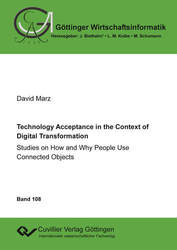| Fachbereiche | |
|---|---|
| Buchreihen (97) |
1381
|
| Nachhaltigkeit |
3
|
| Gesundheitswesen |
1
|
| Geisteswissenschaften |
2370
|
| Medienwissenschaften | 16 |
| Theologie | 57 |
| Philosophie | 102 |
| Rechtswissenschaft | 423 |
| Wirtschaftswissenschaften | 852 |
| Sozialwissenschaften | 417 |
| Sportwissenschaften | 48 |
| Psychologie | 233 |
| Pädagogik | 190 |
| Geschichtswissenschaften | 183 |
| Kunstwissenschaften | 111 |
| Kulturwissenschaften | 166 |
| Literaturwissenschaften | 117 |
| Sprachwissenschaften | 88 |
| Naturwissenschaften |
5407
|
| Ingenieurwissenschaften |
1798
|
| Allgemein |
98
|
|
Leitlinien Unfallchirurgie
5. Auflage bestellen |
|
Erweiterte Suche
Technology Acceptance in the Context of Digital Transformation (Band 108)
Studies on How and Why People Use Connected Objects
David Marz (Autor)Vorschau
Leseprobe, PDF (230 KB)
Inhaltsverzeichnis, PDF (110 KB)
The widespread diffusion of digital, connected objects such as smartphones or tablets as well as the increasing integration of computing and connectivity capabilities into everyday artifacts like TVs and cars have significantly changed individual behavior in recent decades: it has become the norm to interact with technology and to be connected with online resources regardless of time and place. Social interactions have increasingly become intertwined with technology, making it almost impossible to fully participate in everyday life activities without IT. As a final example, with the integration of network connectivity, digital technologies, products, and services are not used in isolation anymore, but working together as assemblages, thereby expanding the range of what they and their users can do. Overall, we have witnessed that IT has become deeply socially embedded in everyday life and routines.
Understanding individual behavior has a long tradition in information systems research. However, given the fundamental changes in recent years related to technology use, it is questionable whether traditional models and theories are still applicable in the digital age. The goal of this dissertation is to address respective shortcomings. As a first step, a comprehensive review of the literature on digital transformation is performed for a better understanding of this phenomenon surrounding the changes we have witnessed regarding individual behavior. Afterwards, new concepts to explain and measure individual behavior and expectations related to connected objects are developed and examined. Furthermore, as the topic of connected objects is closely connected to the concept of personalization, a design study is performed that 1) provides an artifact to handle the efficiency-personalization trade-off in the provision of firm offerings and 2) illustrates how personalization influences the user perceptions of respective products and services. Based on the findings, a framework for the study of connected objects is synthesized and presented. Overall, the findings of this dissertation have relevant implications for research and practice in the fields of technology acceptance, digital life, and digital transformation.
| ISBN-13 (Printausgabe) | 9783736973701 |
| ISBN-13 (E-Book) | 9783736963702 |
| Buchendformat | A5 |
| Sprache | Englisch |
| Seitenanzahl | 276 |
| Umschlagkaschierung | glänzend |
| Auflage | 1 |
| Buchreihe | Göttinger Wirtschaftsinformatik |
| Band | 108 |
| Erscheinungsort | Göttingen |
| Promotionsort | Göttingen |
| Erscheinungsdatum | 03.02.2021 |
| Allgemeine Einordnung | Dissertation |
| Fachbereiche |
Wirtschaftswissenschaften
Betriebswirtschaftslehre |
| Schlagwörter | Technologieakzeptanz, Technology Acceptance, Technologieakzeptanzmodell, Technology Acceptance Model, Digitale Transformation, Digital Transformation, Vernetzte Objekte, Connected Objects, Digitale Ökosysteme, Digital Ecosystems, Private digitale Ökosysteme, Private Digital Ecosystems, Digitales Leben, Digital Life, Digitale Individuen, Digital Individuals, Digitale Technologien, Digital Technologies, Digitales Zeitalter, Digital Age, Konnektivität, Connectivity, Digitale Verbundenheit, Digital Connectedness, Digitalgeschäft, Digital Business, Individuelles Verhalten, Individual Behavior, Ökosystemperspektive, Ecosystem Perspective, Konstruktentwicklung, Construct Development, Personalisierung, Personalization, Informationssysteme, Information Systems, Digitale Innovationen, Digital Innovations, Kundenzufriedenheit, Customer Satisfaction, Organisatorischer Wandel, Organizational Change, Internet der Dinge, Internet of Things, Literaturanalyse, Literature Review, Typologie, Typology, Angebotscharakter, Affordance, Kundenzentrierung, Customer-Centricity, Autonome Fahrzeuge, Autonomous Vehicles, Selbstbestimmungstheorie, Self-Determination Theory, Zielkonflikte, Trade-Offs, Sharing Geschäftsmodelle, Sharing Business Models, Maschinelles Lernen, Machine Learning, Mensch-Computer-Interaktion, Human-Computer Interaction, Kontextualisierung, Contextualization, Psychologie, Psychology, Sozialer Wandel, Social Change, Netzwerkverbindung, Network Connectivity, Frameworkentwicklung, Framework Development, Empirische Untersuchung, Empirical Study, Forschungsagenda, Research Agenda, Strukturgleichungsmodelle, Structural Equation Modeling |








